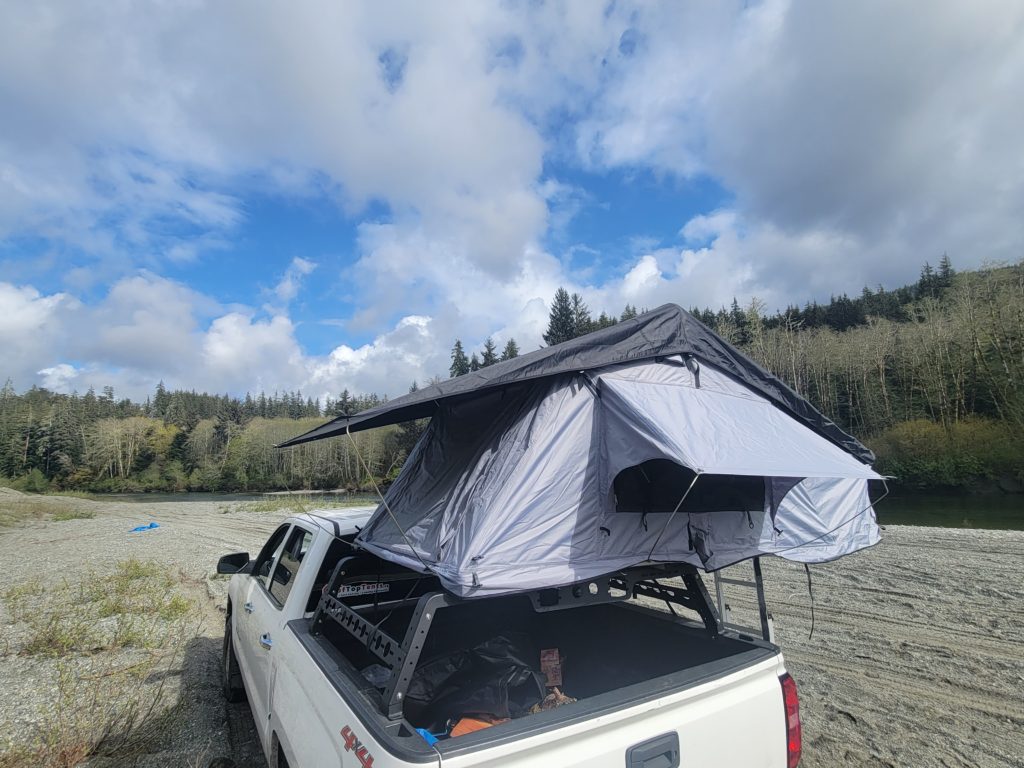A rooftop tent is an excellent investment for anyone who loves camping and being outdoors. Whether you’re Overlanding or going on a big camping trip, a rooftop tent will help you camp comfortably and elevate your outdoor experience. Rooftop tents allow you experience the freedom of opening the roof tent, parking, and enjoying your surroundings without limits. Because it mounts on your car, a rooftop tent provides you with different location options than a traditional tent.
One of the first choices you have to make in purchasing your rooftop tent is to decide the type you want; a soft shell tent or a hard shell tent. This blog post outlines the pros and cons of the two types of rooftop tents and will help you decide which option is best.
Soft-shell Rooftop Tents
Soft-shell Rooftop tents resemble a ground tent set up. They are made with thick and durable waterproof fabric like nylon, canvas, or polyester. The tent body is attached to a rigid platform frame made of fiberglass, hard plastic, or aluminum that hangs off your vehicle’s roof.
Pros:
-
More affordable than hard-shell rooftop tents
Soft-shell tents are generally more affordable than hard-shell tents. These days, soft shell tents are around half the price of a comparable hard shell rooftop tent. This price difference may be a determining factor if you’re new to camping or on a budget.
-
Lighter
Soft-shell tents pack smaller despite being larger than hard-shell tents once set up, making them compatible with smaller vehicles. The fabric build makes them lighter than their hard-shell counterparts, demanding a less heavy-duty roof rack and less manpower for lifting.
-
Added Covered Area
Soft-shell rooftop tent provides a covered area below the tent for relaxing and cooking. This shaded area is an added bonus, especially in desert climates.
-
More Spacious
The soft-shell roof top tents have a little more space to offer. The hard shell rooftop tents are a bit more compact, which may be a better option if you plan to spend extended periods in your tent or bring along extra gear.
Cons:
-
Challenging Setup
The main complaint with soft-shell roof top tents is the difficulty that comes along with setting them up. The poles are often flimsier, and it can be a challenge to get everything tight and in place.
-
More Difficult to Clean
Another potential downside is that they can be more difficult to clean than hard-shell rooftop tents. The fabric can be more delicate and may require special care when cleaning.
-
Less Comfortable
Soft-shell rooftop tents usually have a thinner mattress than hard shell models because the mattress folds in half with the tent.
-
Less Durable
Finally, soft-shell rooftop tents may not be as durable as their hard-shell counterparts. The fabric and materials used in construction are often not as sturdy, which could lead to premature wear and tear.
-
Softshell Rooftop Tents Are Noisier
One final downside to soft-shell rooftop tents is that they tend to be noisier than hard-shell rooftop tents. The fabric can flutter in the wind and make more noise, which can be disruptive when trying to sleep.
Hard-shell Rooftop Tents
Hardshell tents have a hard rigid outer shell made from fiberglass, aluminum, or hard plastic that encloses the tent walls, full mattress, bedding, etc. The tent walls are made from durable waterproof fabric such as canvas or nylon. Set up is usually aided by automated or gas strut mechanisms.
Pros:
-
More Aerodynamic
The hard shell rooftop tents are more aerodynamic. This means that they will create less drag when driving, saving you gas money on long road trips.
-
Easy Setup
One of the advantages of a hard-shell rooftop tent is the setup time. A Hard-shell rooftop tent can take less than a minute to set up because most use a popup or lift mechanism. Another advantage is leaving your bedding set up inside a closed hard-shell tent and avoiding setting up every time you camp.
-
Durability
A Hard-shell rooftop tent is more durable because it has a thicker and stronger shell. The hard materials will protect you from the elements better and last longer than a soft-sided rooftop tent.
-
More Comfortable
Hardshell tents come with thicker and higher quality mattresses than soft shell rooftop tents. The mattress is thicker because it doesn’t have to fold when the tent is packed away. Also, the interior of hard-shell tents feels more uniform.
Cons:
-
More Expensive
Hard-shell tents are significantly more expensive than their soft-sided counterparts. Also, they require a heavier and most likely more costly roof rack.
-
Weight And Size
Hardshell rooftop tents tend to weigh more than soft shell models; the extra weight comes from the rigid top shell. This additional weight makes hard shell roof top tents harder to lift onto the vehicle’s roof. Hard-shell tents are generally more compatible with SUVs and large trucks.
-
Size Restrictions
Most hard-shell rooftop tents have less headroom making them less accomodating for larger groups than soft shell rooftop tents. This is due to the rigid top shell taking up valuable space inside the tent. It also limits the opportunity for add-ons like annexes and awnings.
Conclusion
Everyone has their priorities and requirements. Both the hard shell roof top tent and the soft shell rooftop tent are great options for camping in the outdoors. Hardshell rooftop tents are remarkable for their easy setup and perfect for those always on the move. While the soft shell tents initially take more time to set up, they are roomier, so they may be better for groups of three or more or those with more gear. Their area coverage allows for the easy addition of a covered annex for inclement weather.
Visit rooftoptents.ca today to find your perfect adventure companion!


